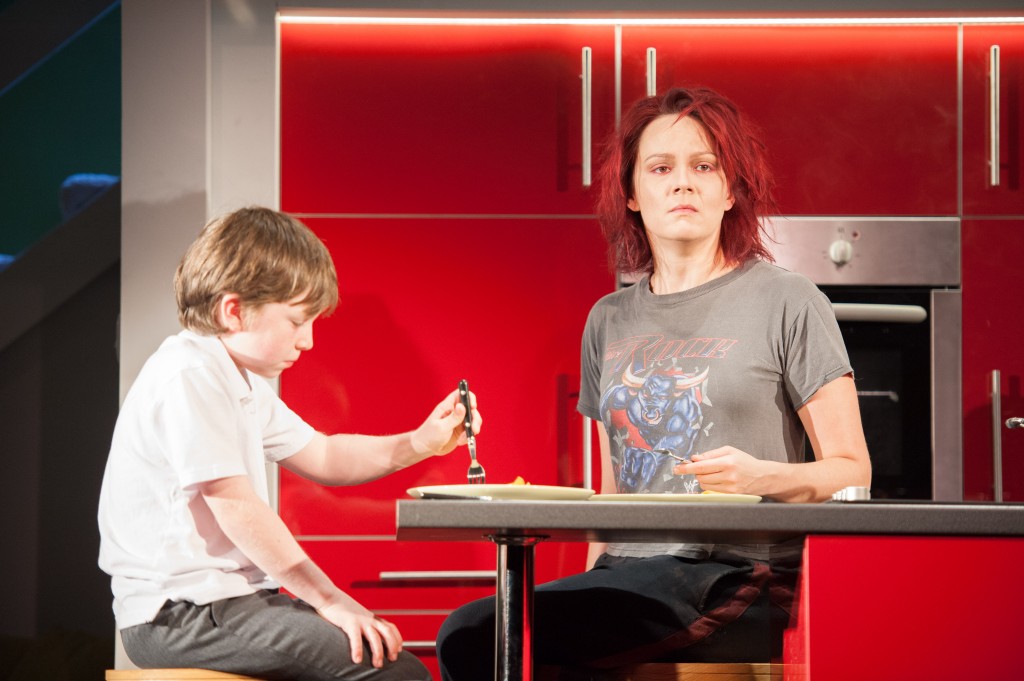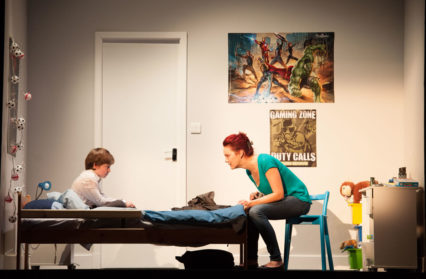Gary Raymond visited the Sherman Theatre to review Medea, a retelling of Euripides’ classic, adapted and directed by Headlong and Mike Bartlett.
In 1992 Diana Rigg won the acclaim of the West End and Broadway critics for her portrayal of one of classical theatre’s most enduring characters, Medea, in Alistair Elliot’s new translation. Rigg’s performance is still regarded as the stage’s most convincing and striking portrayal in modern times, of the woman, the princess, who is driven to commit unspeakable crimes in revenge for her husband’s transgressions. In his review in the New York Times of the run at the Longacre Theatre, Vincent Canby praises Ms Rigg whilst at the same time questioning her initial approach to the role, and remaining unconvinced by the ‘wrong-headedness’ of the production as a whole. Rigg’s Medea, Canby writes, is a victim, and to play it this way is ‘to humble one of the world’s titanic creations.’ What Canby goes on to say is that there were fundamental flaws with the conception of that production in 1992, but what Rigg does at the centre was truly something remarkable. Twenty-odd years on, and Rigg’s daughter, Rachael Stirling, is worthy of just as much praise, whilst also suffering the undermining of almost everything that goes on around her. Whereas Rigg may have had to come to terms with an imbalance in the production with the Euripides original, Stirling finds herself in what is essentially something delivered from and to a Wednesday Night ITV Drama sensibility.

Headlong Theatre
Directed and adapted by Mike Bartlett
Starring: Rachael Stirling, Adam Levy, Paul Shelley
Sherman Theatre, Cardiff
Mike Bartlett, who has written as well as directed this new version, has largely dispensed with the poetry and contemplation of Euripides and in place has installed some zinging dialogue and interesting (although not particularly successful) innovation. The problem is that much of the power of Euripides is left behind, and it is easy to wonder if the production ever really came to terms with the true meaning of the source text.
Medea is the daughter of a King, who, having fallen in love with Jason, in Colchis to steel the Golden Fleece, murders and dismembers her own brother in order to secure his escape. She is a witch (as Stirling’s Medea incongruously tells us on more than one occasion), a barbaric sorceress. This is an integral part of Euripides’ story. The social culture of 5th Century BC Athens meant that anyone who was not born Athenian of two Athenian parents were classed as lesser beings, as Barbarians (the term comes from the mockery Athenians held for the sound of any foreign tongue, for which they bleated out the sound, ‘baa baa baa’). Euripides was talking to his audience about the inherent dangers of such isolationist attitudes, such arrogance, such elitism. Here, in Bartlett’s Medea, she is no princess, no murderer, no sorceress (although she did find it difficult to make friends, we are told). She has come from London, apparently, to an indifferent suburbia. All images of Maria Callas’ iconic performance in the role, in Pasolini’s shocking, visceral film version from 1969, are immediately expunged. This is Medea in Brookside Close.
The power for the audience and the characters is irredeemably diluted. Gone is her sacrifice of wiping out her own kind for Jason. Gone also are Jason’s motives for leaving Medea for a younger bride. Euripides, wrestling with these ideas of place and belonging, had Jason making a difficult but necessary decision; by marrying the daughter of the King of Corinth he is securing the future of his children, giving them royal standing and making them insiders rather than Barbarians. Adam Levy’s Jason has no such conflict about him. He has had to wrestle with no such dilemmas. His crimes, although in the end paling into insignificance when Medea has her say, are simply those of a pitiful stereotype, it seems; a man led by his penis, bored by his wife. Medea accuses him of this, and he has no serious rebuttal; not as in Euripides’ play.
In Bartlett’s vision, Medea is a middle-class soap opera with a grizzly climax, a decidedly modest take on one of theatre’s most gruelling stories. It’s like setting Hamlet in a parish council, or The Iceman Cometh in the offices of an advertising agency. The universality, the power, is already there in the original play. Medea is not a universal story because the kitchen unit is recognisably from Ikea, or her vernacular is fiery; it is universal because it is about displacement, about proto-feminist issues, and most importantly it is about civilisation’s ignorance of the world of emotion. And it is this intrinsic prime theme of Euripides’ drama that Bartlett’s version cannot come to terms with – because he has ignored Jason’s honourable motivations for his betrayal. The lesson of Euripides’ play is that the cold, grey, civilised world of man (embodied in Jason) ignores the passionate, irrational, emotional world (embodied in Medea). What Jason does in securing a future for his children is ignore the feelings of his murderous, sorceress wife; rather than fight for his family, he succumbs to the prejudices of his adopted people.
In the Pasolini film the audience are subjected to a long and graphic scene of human sacrifice in Colchis, rendered to ensure a successful harvest, before Medea has even met Jason. It emphasises the barbarism of Medea and her people, her connection to ancient ritual and the dirt and dust of the hardest of ‘old ways’. When Jason turns up he is in gleaming armour and scented appropriately as one from marbled hallways of the civilised Greek world. The play is from then on a cosmic battle between the forces of thudding, cold modernity and the ways of the old world. As soon as Bartlett makes Jason a somewhat typical ‘husband-who-strays’, favouring the kitchen sink drama over the two and half thousand year old work of genius, the play strives to be mediocre.

Photo: Manuel Harlan
But as with Elliot’s version in 1992, Medea here is played with an arresting vitality and courage. Rachael Stirling is a vivid Medea, equally enticing and believably menacing. It is a role to die for, and Stirling throws everything she has at it, including extremely well-judged moments of restraint. She has tapped in to an important element of the figure of Medea: that she is entirely sexual, it is her primal instinct; it drove her to kill her brother, and then to kill her children (here the one son; in Euripides, the two). Jason uses sex to achieve goals (escaping Colchis with the fleece, ensuring the safety of his children by marrying the daughter of King Creon); Medea is in thrall to her sexual impulses. Stirling fills this sexual potential, this craving possession and slavery. She is barbed, dangerous and the life-force of every scene. The inconsistencies of her character are handled with admirable attempts at balance. She states several times that she is a witch. Had the production been given any sort of gothic or classical affectation the statements would not have come across as quite so odd, but Stirling is extremely believable at the unhinged end of the scale, even when the script she is working from is less so.
In Bartlett’s vision, Medea is a middle-class soap opera with a grizzly climax, a decidedly modest take on one of theatre’s most gruelling stories.
The major problem of the play, apart from its original conception, is the complete disregard for the climax. Medea is perhaps the most famous use of the deus ex machina in all theatre. Euripides’ Medea is the granddaughter of the Sun god, and after she has butchered her children on the roof of the house she and Jason shared for many years, with carnage all around, the Sun god arrives in a fiery chariot and whisks her off to her promised sanctuary, the house of King Aegeus of Athens (in this version, a rather sordid timeshare on the Costa del Sol). Awaiting an ingenious plot invention, where something powerful and credible is put in place of the deus ex machina, what the audience is given is a lazy, poorly set up pleading to some god or other who hitherto has been of no concern to a single character, never mind the Medea who, it seems, is to be saved by him. The less said about the Fisher Price set the better, but this is supposed to be the moment when a blood-smattered witch stands amidst the bodies of her butchered children, amid cacophonous dialogue between the cackling murderess and the distraught father. What Bartlett’s Medea has is a baggy, almost confused speech, barely attempting to bring together the themes of his own play, moving thuddingly toward a failed moment of truth (that she gets away with it all). Stirling still manages to growl and shudder through it, a truly marvellous performance. It is just such a shame she will probably never have the opportunity to play a real Medea, with all of the wonderful, deep, difficult, uncomfortable riches that fill the poetry of Euripides.
All images from medeaheadlong.com
Gary Raymond is a novelist, critic, editor and broadcaster.



 Enjoyed this article? Support our writers directly by buying them a coffee and clicking this link.
Enjoyed this article? Support our writers directly by buying them a coffee and clicking this link.








